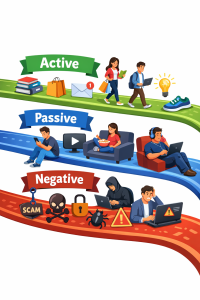I’ve been listening to a lecture on Dopamine so thought it would be interesting to document. Dopamine is a neurotransmitter, ()chemical messenger in the brain) that plays a crucial role in transmitting signals between nerve cells; it’s involved in many important functions, including movement, motivation, reward, pleasure, and mood regulation, so here is a summary :
- Reward and Pleasure
- Motivation and Reward System: Dopamine is heavily involved in the brain’s reward system. It is released in response to pleasurable activities such as eating, exercising, and social interactions. This release reinforces behaviors by creating a feeling of pleasure, which motivates individuals to repeat those behaviors.
- Addiction: The same reward pathway can also play a role in addiction. Substances like drugs, alcohol, or certain behaviors can cause a surge of dopamine, leading to repeated use as the brain craves the rewarding effects.
- Movement and Coordination
- Motor Control: Dopamine is crucial for coordinating smooth, voluntary movements. The neurotransmitter is produced in a part of the brain called the substantia nigra, and it helps regulate motor functions by affecting other parts of the brain, such as the basal ganglia.
- Parkinson’s Disease: A deficiency of dopamine in the substantia nigra is associated with Parkinson’s disease, a condition characterized by tremors, stiffness, and difficulty with movement.
- Cognition and Memory
- Learning and Memory: Dopamine is involved in learning and memory processes. It helps the brain recognize and remember experiences that are rewarding, which is important for adaptive behaviors.
- Attention: Dopamine also plays a role in attention and focus. Abnormal dopamine levels can be associated with attention-deficit/hyperactivity disorder (ADHD).
- Mood Regulation
- Emotional Responses: Dopamine influences mood and emotional responses. Imbalances in dopamine levels can contribute to mood disorders such as depression and bipolar disorder.
- Regulation of Prolactin
- Inhibition of Prolactin: Dopamine acts to inhibit the release of prolactin, a hormone responsible for milk production in mammals. This regulatory role is important in maintaining hormonal balance.
Dopamine and Its Role in Disorders
- Parkinson’s Disease: As mentioned, a deficiency of dopamine, particularly in the substantia nigra region of the brain, leads to the motor symptoms of Parkinson’s disease. Treatment often involves medications that increase dopamine levels or mimic its effects.
- Schizophrenia: Overactivity of dopamine in certain brain pathways is associated with the symptoms of schizophrenia, such as hallucinations and delusions. Antipsychotic medications often work by blocking dopamine receptors to reduce this overactivity.
- Depression: Low dopamine levels can contribute to the symptoms of depression, such as lack of motivation, pleasure, and energy. Some antidepressants work by increasing dopamine levels in the brain.
- ADHD: Dopamine dysregulation is also implicated in ADHD, where low levels may lead to symptoms such as inattention, hyperactivity, and impulsiveness. Stimulant medications used to treat ADHD often increase dopamine levels.
How Dopamine Works
Dopamine operates by binding to dopamine receptors on the surfaces of neurons. There are several types of dopamine receptors, each playing different roles in the brain. Once released from a neuron, dopamine crosses the synapse (the gap between neurons) and binds to receptors on the next neuron, transmitting the signal. Afterward, dopamine is either reabsorbed by the original neuron or broken down by enzymes.
Natural Ways to Boost Dopamine
- Exercise: Regular physical activity is known to increase dopamine levels and improve mood.
- Diet: Eating foods rich in tyrosine, an amino acid that the body uses to produce dopamine, can help maintain healthy dopamine levels. Foods like almonds, bananas, avocados, eggs, and fish are good sources.
- Sleep: Getting enough quality sleep helps regulate dopamine levels, particularly in areas of the brain that control mood and alertness.
- Mindfulness and Meditation: Practices like meditation can boost dopamine production, contributing to improved focus and a sense of well-being.
Dopamine is therefore essential to the body, but where we have to be careful is in its part in behaviour which can become addictive.
Overall, any substance, behaviour or pattern of thought which stimulates high dopamine and which is easily accessed / without the expense of any effort on the part of the person concerned is potentially dangerous. Big increases in dopamine which are not preceeded by significant effort are potentially problematic. Consider the usage of drugs such as amphetamine or cocaine; these then result in huge releases in dopamine. Our brain developed to respond to dopamine as a result of an evolutionary goal or purpose that was for the betterment of the individual/species and “rewards” them for so doing in order to encourage repetition or similar behaviour.
The huge drop off in dopamine after engaging in behaviour that causes a “low” which then prompts people to reach for the next “hit”; some substances more so than others. That morning caffeine does cause a spike as will eating chocolate or ice cream or even listening to your favourite music track but the “low” isn’t the same as after ingesting drugs or gambling.
It’s easy to gravitate towards something that is easily available to us, especially when we can go into a supermarket and pick up a bottle or go online and gamble or view pornography. But such patterns nearly always end up in disaster and need us to go cold turkey, sometimes for ever. People end up dejected and sometimes in debt as a result of this and then have to handle the consequences of their behaviour at a stage when it’s gone well beyond the limit. They end up hurting those around them as well as not being there for their family at important stages in their life which then goes on to have an effect on these individuals and their own self worth as they grow up.
As always, if you have any concerns about addiction, please reach out to someone or message us here; please never think there is nothing that can be done.



